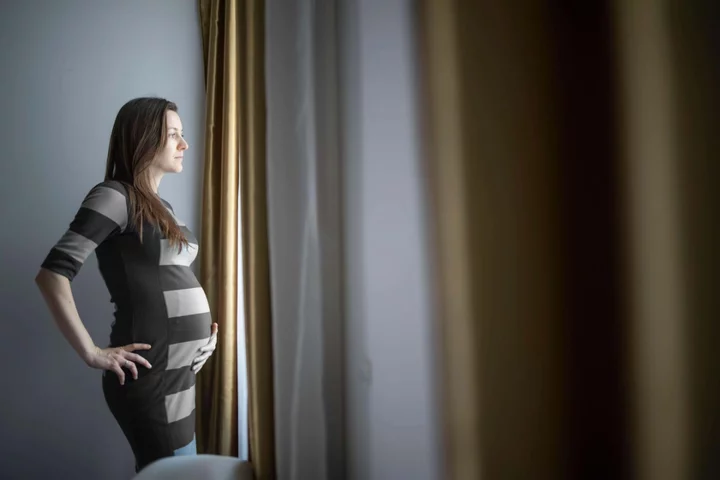
Jasmine Harman tearfully recalls mother’s struggles with hoarding
TV presenter Jasmine Harman became emotional as she opened up about her mother’s struggles with hoarding – and how it adversely impacted their relationship for years. The host of Channel 4’s A Place in the Sun, Harman, 47, said she “refused to bring people home” and was “really, really embarrassed and ashamed” about her mum Vasoulla’s condition, on Wednesday (25 October) during an appearance on This Morning. “In fact, when I started working in television, it was my biggest fear that someone would find out about the way I’d grown up and the way that we lived at the time,” she told Dermot O’Leary and Allison Hammond. Reflecting on how things had changed since then, Harman teared up as she affirmed her priority is “having a loving relationship” with Vasoulla – and not “focussing on the hoarding” anymore. Addressing her mother, Harman added: “She’s helped me to become a much more compassionate person. We used to fight, didn’t we? “But now we have a relationship that’s outside [of the hoarding].” Hoarding was recognised as a mental health disorder in 2013. According to the World Health Organisation (WHO), it is characterised by “an accumulation of possessions due to excessive acquisition of, or difficulty discarding possessions, regardless of their actual value”. The Diagnostic and Statistical Manual of Mental Disorders (DSM) outlines detailed criteria that psychologists can use to diagnose hoarding, including cluttered living spaces where the room’s intended use [of cooking, sleeping, or sleeping] has become impossible. These behaviours usually appear during a person’s early life, with Vasoulla explaining it was triggered by “the trauma of loss” in her case. “We moved from Cyprus when I was about three so I left my baby things back home and started collecting trinkets in bombed-out houses that were still about in the early Sixties, after the war – trinkets that I treasured,” she explained. “Then we moved back to Cyprus for a couple of years and those things all got lost. Then we moved back to England and all my new ties got lost – so I just had lots of upheaval, lots of loss.” Vasoulla, whose father was killed in Cyprus, added: “It’s more the loss, like a bereavement. Losing your father is a big thing, moving country ...you lose everything and you get a new place to live. The trauma of loss [is] something that a lot of people have as the onset of their hoarding behaviour.” The mother-daughter duo previously opened up about how hoarding affected their lives in a 2011 BBC documentary, titled My Hoarder Mum & Me. Speaking about the “cathartic experience”, Harman on Wednesday confessed:“I genuinely had no idea how many people were affected by this.” Around three million people are reportedly impacted by the mental health condition, according to Hoarding Disorders UK. The organisation’s director Jo Cook, who joined Vasoulla and Harman on the This Morning couch, explained that hoarding is neither a lifestyle choice, nor “about poor housekeeping”. When asked about supporting loved ones who might struggle with hoarding, Cook recommended joining a support group and approaching the anxiety-based disorder with empathy. “It’s really important that that person that you’re helping, feels safe in their home with you. Because, essentially, you’re unpicking someone’s nest, so you need to make sure you’re doing it slowly and surely,” she added. If you have been affected by this article, you can contact the following organisations for support: actiononaddiction.org.uk, mind.org.uk, nhs.uk/livewell/mentalhealth, mentalhealth.org.uk. Read More Pete Davidson is on the market for a hot date - but not for him Gym math: How to optimise 22 minutes exercise a day according to fitness experts Neglecting women’s health at work could cost UK economy £20.2bn a year – analysis Gym math: How to optimise 22 minutes exercise a day according to fitness experts Neglecting women’s health at work could cost UK economy £20.2bn a year – analysis Nearly three-quarters of mothers feel invisible, study suggests
2023-10-25 21:46

New report from PEN America documents vast book bannings in US prisons
A new study from PEN America finds that tens of thousands of books are banned or restricted by U.S. prisons
2023-10-25 21:46

Why Is the First Episode of a TV Show Called a ‘Pilot’?
Getting a concept onto the big screen is a difficult process, and the pilot episode is what can make—or, more often, break—a series. By why is it called that?
2023-10-25 21:28

New report from PEN America documents vast book bannings in U.S. prisons
A new study from PEN America finds that tens of thousands of books are banned or restricted by U.S. prisons
2023-10-25 21:24

Neglecting women’s health at work could cost UK economy £20.2bn a year – analysis
Neglecting women’s health in the workplace could be costing the UK economy around £20.2 billion each year, analysis has suggested. In a new survey of 2,000 women, 68% said that they have dealt with health issues at some point in their career, whilst almost 29% felt their employers were not supportive. When factoring in specific health matters that relate to women, including endometriosis, fertility, menopause and periods, this figure increases to 36%, leaving 46% of women worried that their health could impact their career trajectory and 48% thinking they would be forced to resign. The study conducted by AXA Health in partnership with the Centre of Economics and Business Research (CEBR) also suggested that 83% of women have had their personal finances affected when faced with health issues. For instance, 52% of women have had to take time off, 22% missed out on a promotion and 20% settled for lower pay. Economic modelling from AXA Health and CEBR suggested that ignoring women’s health at work could be costing the UK economy £20.2 billion a year. From 90% of women struggling emotionally, 46% feeling helpless and 43% feeling less motivated at work, this issue has also had a huge impact on their mental health and wellbeing. “As this report finds, neglecting the health of women in our workplaces isn’t just a matter of compassion; it’s a serious economic oversight,” said Flick Drummond MP, who is serving as the co-chair of the All-Party Parliamentary Group on Women and Work. Dr Pallavi Bradshaw, deputy chief medical officer at AXA Health, added: “While companies certainly still have a way to go in addressing women’s health at work, there is promise in the increased willingness of women to discuss their health concerns with colleagues and managers.. “For example, our women’s health report found that 60% of women who talked about their health found their employers to be supportive, whether this be through time off, offering counselling or making adaptations to the workplace. “These developments are positive, but as we delve further into the findings, it becomes evident that concerns extend beyond just health issues. A striking 53% of the women we surveyed voiced that, within their workplaces, women often shoulder more unplanned responsibilities – such as caring for loved ones – than their male counterparts. “Furthermore, when reflecting on their own families, 39% of respondents revealed that they bear a greater burden than male family members when it came to unexpected caring responsibilities. This gender-based imbalance in unpaid labour not only perpetuates inequality but also places women at risk of being sidelined in their careers, overlooked for promotions, or compelled to work beneath their true potential.” Bradshaw said the economic impact of neglecting women’s health is “still significant”, and urged the need for “more education, robust workplace policies and talent retention initiatives”. The report suggested women who work part-time are hit even harder when it comes to health-related issues. It found that 61% are worried about having to leave their jobs prematurely, which exceeds the average by 19%. Only 17% of women who work full-time believe that conversations surrounding women’s health are not encouraged in their workplaces, but this increases to 23% for those who are employed part-time. According to a report conducted by The Royal College of Obstetricians and Gynaecologists, women represent 51% of the population and 47% of the workforce. Read More Nearly three-quarters of mothers feel invisible, study suggests The best ways to work-out in 22 minutes – as study finds this is magic number for offsetting ‘negative impact of sitting’ What crops will we be growing in the future, as climate change alters the landscape? As Rebecca Adlington shares heart-breaking miscarriage news: How to support others experiencing baby loss What you need to know about new research into treating cervical cancer How to do Halloween make up and still take care of your skin
2023-10-25 19:49

Nearly three-quarters of mothers feel invisible, study suggests
Most women feel ‘invisible’ and ‘unappreciated’ when they become mothers, new research has revealed. Instead of ‘having it all’, 72% of mums feel invisible and 93% feel unappreciated, unacknowledged or unseen once they’ve had children. Another 93% said that since having a child, their identity has been reduced to only being a mother. And the weight of expectation is huge, too, with 97% of mums questioned in the survey by the online motherhood community Peanut saying pressure is put on them to ‘do it all and be it all’. Plus, 94% believe they’re expected to put themselves last and self-sacrifice for their families, partners, jobs, and other responsibilities, so they can achieve what they feel is required of them. Nearly half of mums (46%) said they don’t feel supported by the healthcare system after giving birth, and 70% expected more support from society in general. As a result of this lack of support and invisibility, most women surveyed (95%) agreed there’s an impact on their mental health and wellbeing, with 86% having experienced anxiety, 82% feeling stressed, burned out or exhausted, and 80% feeling overwhelmed, or lonely and isolated. Other strong feelings identified by mums included irritability (78%), loss of identity (65%), feeling judged (66%), feeling unsupported (64%), guilt (63%), depression (55%), resentment (54%), worthlessness (50%), and neglect (24%). Women attributed the things making them feel invisible to unfair division of labour in the home, trying to juggle a career and childcare, lack of empathy and understanding from both family and everyone else, gaps in healthcare and mental health support, identity and independence struggles, hiding the pain of pregnancy loss, and general pressure from healthcare, education institutions and the media. Commenting on the findings, psychologist Dr Rachel Goldman said: “The invisibility of motherhood is a stark reality many face. The journey begins with frequent visits to healthcare providers, but once the child arrives, there’s a sudden gap, creating a sense of abandonment. Women grapple with overwhelming feelings of exhaustion and stress, only to confront rushed appointments where healthcare professionals don’t have time to adequately dive into concerns.” As a result of the research, Peanut has launched an Invisible Mothers campaign, featuring a State of Invisibility report, to draw attention to mums’ struggles and highlight ways to make them more visible and better supported. The report found mums think more empathy and gender equality will help them feel more visible, with 82% calling for flexible, family-friendly workplaces, 77% wanting equal and extended leave for both parents, and 71% saying an equal share of parenting tasks would help. Additional measures that will help mums, says Peanut, include more public toilets having changing facilities, additional resources for mental health support, support groups for both parents, and educational initiatives about gender stereotypes. The report also identified the most common unwanted questions that contribute to mothers’ feelings of invisibility, with alternative suggestions that women say they would prefer to hear. So instead of asking ‘How’s the baby?’, Peanut suggests mums are asked ‘How are you really – mentally, emotionally and physically?’, and rather than ‘Was the pregnancy planned?’, try ‘Are you excited?’, and change ‘How do you do it all?’ to ‘How’s the mental load?’. Goldman added: “It doesn’t take grand gestures to offer support. A genuine ‘how are you’ or ‘thinking of you’ can significantly shift perceptions, signalling to someone that they matter. Small changes or actions, like compassionate conversations, can have profound impacts. “By acknowledging and addressing these issues, we can begin to truly support motherhood.” Read More The best ways to work-out in 22 minutes – as study finds this is magic number for offsetting ‘negative impact of sitting’ What crops will we be growing in the future, as climate change alters the landscape? As Rebecca Adlington shares heart-breaking miscarriage news: How to support others experiencing baby loss What you need to know about new research into treating cervical cancer How to do Halloween make up and still take care of your skin Which houseplants best suit your star sign?
2023-10-25 19:28

Love it or hate it, feelings run high over candy corn come Halloween
Cruel joke for trick-or-treaters or coveted seasonal delight
2023-10-24 20:22

Chatbots might disrupt math and computer science classes. Some teachers see upsides
As schools across the country debate banning AI chatbots, some math and computer science teachers are embracing them as just another tool
2023-10-24 19:25

12 Novels Inspired by Real Events
Novelists have used everything from real killers to newsworthy hostage situations to literal white whales to craft their fiction.
2023-10-24 06:26

Exhibits and collectors editions mark 400th anniversary of Shakespeare's First Folio
On the 400th anniversary of Shakespeare’s First Folio, rare originals are being displayed and publishers are offering collectors editions, including one that sells for $1,500
2023-10-24 05:26

11 Illuminating Facts About the Movie ‘Twilight’
It’s never a bad time to talk about the baseball scene in ‘Twilight.’
2023-10-24 02:19

21 French Names You’re Probably Mispronouncing
The pronunciations of names like ‘Yves’ and ‘Geneviève’ aren’t hard once you’ve heard them a few times.
2023-10-24 00:21
